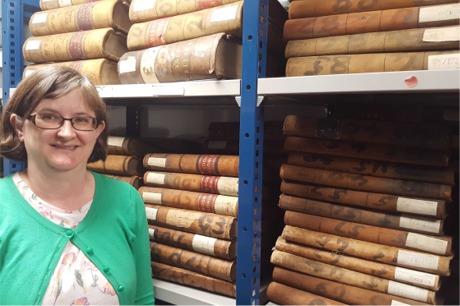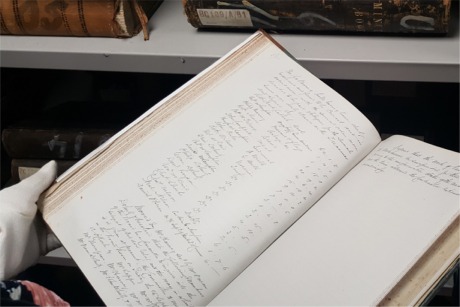|
|
Niamh gives voice to the history
of Donegal
27.09.18
THE Archive Service of
Donegal County Council is trying to locate relations
of the late Daniel Doherty, who left Malin Head for
Boston in the early 1900s and made a name for
himself in the Irish political scene there.
Niamh Brennan, Donegal County Archivist, hopes to
develop a travelling exhibition next year based on
the archive’s collection of Mr Doherty’s papers,
which include letters from John F. and Robert F.
Kennedy and Charles DeGaulle. Daniel Doherty died in
the 1970s.
“He had quite an amazing life,” Niamh said. |
 |
|
Niamh Brennan, with some of the rich
collection of records held by the Archive Service. |
The archives give voice
to the rich history of Donegal and its people,
through the records and writings of organisations
and individuals. As archivist, Niamh not only
catalogues, researches and maintains the
collections, but finds creative ways to bring them
to the public.
“Over the last twenty odd years we’ve acquired more
and more, which means we’ve a really good collection
for Donegal,” Niamh said.
Archives are documents, such as minutes of county
meetings, letters, maps, drawings, blueprints,
manuscripts, literature and other records. They tell
us what generations of Donegal people said and did –
even, at times, what they thought.
The more personal pieces often draw the most
attention. Niamh was interviewed by RTÉ News last
year when the archive discovered a 19th-century
Valentine’s Day letter in the collection of the
Steele Nicholson family of Falmore House, Gleneely,
Inishowen. This summer they were in the news after
receiving documents related to the opening of the
Coláiste Uladh building in Gorthork fifty years ago,
including a letter from President Eamon de Valera to
Breandán Mac Cnáimhsí, coláiste president. |
 |
|
A page from the minutes of the
Inishowen Workhouse, held in the collection of the
Archive Service. |
The archive also produces booklets and other
publications, and Niamh curated the exhibition, A
Trek Through Time, which is travelling the county
and uses photographs, letters, official documents,
newspaper articles, and other archive items to
illustrate themes and events from the past 250
years. She is working with the museum on an
exhibition on emigration for the autumn.
The growing collection means that space is a
challenge – even with two additional rented storage
spaces, it’s getting tight. Still, Niamh encourages
people to contact the archive before they throw away
something that could be of significance to the
history or culture of the county.
“We try to get out the message that before you
destroy anything to come to the archives first to
see if it’s worth preserving,” she said. If a
document is worth preserving, Niamh will find room. |
|

